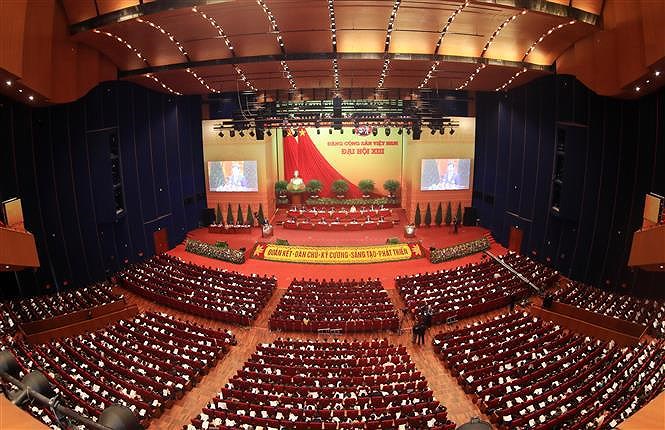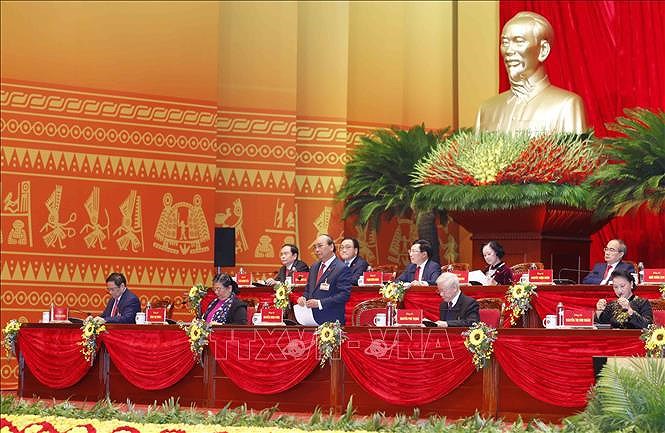Twelve delegates delivered their ideas on how to boost national development in the next five years during a discussion session at the hall on January 27 morning as part of the 13th National Party Congress.
 An overview of the discussion session (Photo: VNA)
An overview of the discussion session (Photo: VNA)– Twelve delegates delivered their ideas on how to boost
national development in the next five years during a discussion session at the
hall on January 27 morning as part of the 13th National Party
Congress.
Tran Thanh Man, Secretary of the Party Central Committee and
President of the Vietnam Fatherland Front (VFF) Central Committee, presented a
report on promoting the strength of the great national unity and reforming the
content and methods and increasing the quality of activities of the VFF and
socio-political organisations.
Phan Van Giang, member of the Party Central Committee, Deputy
Minister of National Defence and Chief of the General Staff of the Vietnam
People’s Army, spoke about how to consolidate and strengthen the all-people
defence posture, and continue building a revolutionary, regular, élite and
modern people’s army.
Politburo member and Minister of Public Security To Lam presented
his views on building a clean and strong public security force, promoting the
force’s core role, maintaining national security, protecting social safety and
order, and contributing to national building and defence cause.
Member of the Party Central Committee and Standing Deputy
Chief Judge of the Supreme People’s Court, Le Hong Quang, highlighted the
importance of effectively implementing judicial reform and building a law-governed
socialist state of the people, by the people and for the people.
Party Central Committee member and Minister of Finance Dinh
Tien Dung talked about building a modern national finance to meet requirements
of sustainable development.
 On behalf of the Presidium, Politburo member, Prime Minister Nguyen Xuan Phuc chairs the session (Photo: VNA)
On behalf of the Presidium, Politburo member, Prime Minister Nguyen Xuan Phuc chairs the session (Photo: VNA)
Meanwhile, Vice Secretary of Hanoi’s Party Committee Nguyen
Van Phong presented a report on building and turning Hanoi into a major hub of
culture, science, education, economy, and international transactions.
Nguyen Hong Linh, member of the Party Central Committee and deputy
head of the Party Central Committee’s Commission for Mass Mobilisation, emphasized
the need to continue renewing the Party’s mass mobilization work so as to
further consolidate people’s trust in the Party and tighten the bond between
the Party and people.
How to develop the knowledge economy as well as
international and practical experience of Ho Chi Minh City in the field were presented
by Nguyen Thanh Phong, member of the Party Central Committee, Vice Secretary of
the municipal Party Committee and Chairman of the People’s Committee of the
city.
A report titled “Party and people-to-people diplomacy proactively
adapts and promote efficiency in the new context” was presented by member of
the Party Central Committee and head of the Party Central Committee’s
Commission for External Relations Hoang Binh Quan.
Meanwhile, Secretary of Bac Giang province’s Party Committee
Duong Van Thai talked about diverse agricultural development in Bac Giang based
on specific conditions of the mountainous-midland region.
Member of the Party Central Committee and Minister of
Education and Training Phung Xuan Nha spoke about continuing the effective
implementation of the Party Central Committee’s resolution on reforming
education and training fundamentally and comprehensively in the 2021-2025
period.
Tran Duc Quan, Secretary of the Party Committee and Chairman
of the People’s Council of the Central Highlands province of Lam Dong presented
ideas on how to link agriculture and processing industry, export markets and
global supply chains in the province.
In the afternoon, discussions on the congress’s documents
continued, with a focus on developing agriculture, building new-style rural
areas, increasing the effectiveness of monetary policy governance and banking
activities, renewing the organisation and operation of the trade union
organisation, and building the circular economy during 2021-2030./.